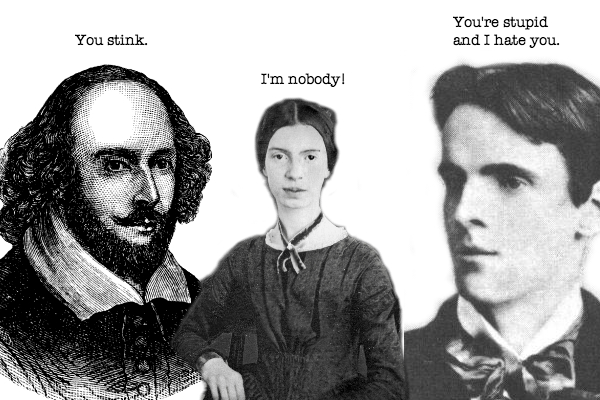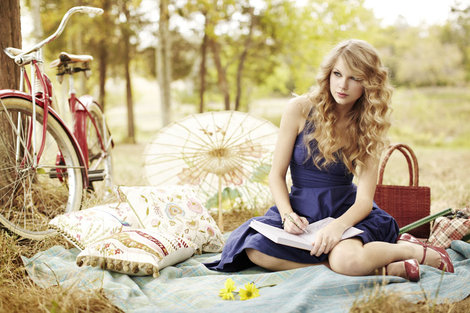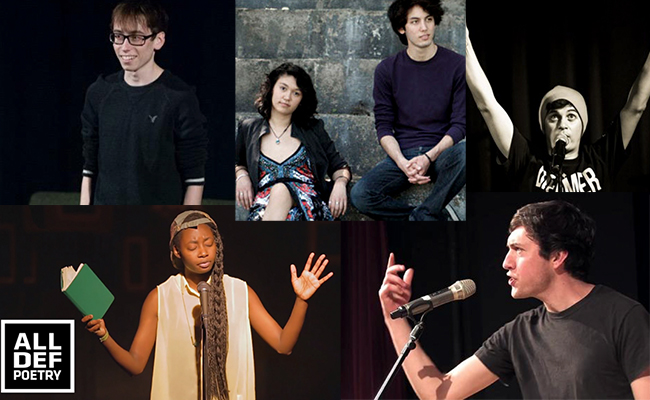Haters Gonna Versificate: Some of Our Favorite Poetic Insults for National Poetry Month
Poems can invoke the deepest of emotions, the most beautiful of sentiments, but they can also pack a huge, insulting punch. There’s something about the form—maybe the lilt, the rhythm—that lends itself perfectly to derision and condescension. Need to tell someone that they’re beneath you? A short story won’t do. Want to skewer your professional rival? Veiled allusions in your novel aren’t going to cut it. What you need is a good meter to set your scorn to.
Since April is National Poetry Month, let’s explore the poems that expertly take their targets’ ego and grind it under their perfectly cadenced heel.
1.Sonnet 130, William Shakespeare
My mistress’ eyes are nothing like the sun;
Coral is far more red than her lips’ red;
If snow be white, why then her breasts are dun;
If hairs be wires, black wires grow on her head.
If have seen roses damasked, red and white,
But no such roses see I in her cheeks;
And in some perfumes is there more delight
Than in the breath that from my mistress reeks.
I love to hear her speak, yet well I know
That music hath a far more pleasing sound;
I grant I never saw a goddess go;
My mistress when she walks treads on the ground.
And yet, by heaven, I think my love as rare
As any she belied with false compare.
Sure in the end the poem is about a love that transcends beauty, but can you imagine receiving this? Would you have managed to finish it? Because I probably would have torn this sucker up by the fourth line. There’s really nothing about this poor woman good old Bill leaves alone. Her breath, her hair, it’s all up for grabs. We’re all aware of Shakespeare’s acerbic wit, but with all the backhanded compliments, he would have given even the biggest pick up artist a run for his money.
2.“The Scholars,” William Butler Yeats
Bald heads forgetful of their sins,
Old, learned, respectable bald heads
Edit and annotate the lines
That young men, tossing on their beds,
Rhymed out in love’s despair
To flatter beauty’s ignorant ear.
They’ll cough in the ink to the world’s end;
Wear out the carpet with their shoes
Earning respect; have no strange friend;
If they have sinned nobody knows.
Lord, what would they say
Should their Catullus walk that way?
How best to get back at the critics that don’t seem to understand the genius of your poetry? Write a poem about it, of course. They’re bald, old, living in obscurity, what could they possibly know? Don’t they know who you are? You’re Yeats, and you feel things like no one else does. How dare they sit in judgment of you.
Oh, and “beauty’s ignorant ear” most likely belongs to Maude Gonne, the Irish revolutionary who constantly turned the poet down (and to be fair, Yeats got totally creepy: he went on to propose to her daughter after years of rejection).
3.“I’m Nobody! Who are you?” Emily Dickinson
I’m Nobody! Who are you?
Are you – Nobody – too?
Then there’s a pair of us!
Don’t tell! They’d advertise – you know!
How dreary – to be – Somebody!
How public – like a Frog –
To tell one’s name – the livelong June –
To an admiring Bog!
Emily Dickinson was pretty famously a recluse. She was not well known during her lifetime, and never courted the spotlight. It’s pretty clear that she looked down on celebrity, and made the reader complicit, a fellow Nobody in the sea of Somebodies. Dickinson was painfully aware of the fickleness of fame, the unfaithfulness of a public just as likely to shun you as it is to adore you to an uncomfortable degree (an alternate version of the fourth line read: “Don’t tell! They’d banish us, you know”) and this poem serves as a stinging indictment of self-promotion.
4.The Dunciad, Alexander Pope
He chinks his purse, and takes his seat of state:
With ready quills the dedicators wait;
Now at his head the dext'rous task commence,
And, instant, fancy feels the imputed sense;
Now gentle touches wanton o'er his face,
He struts Adonis, and affects grimace:
Rolli the feather to his ear conveys,
Then his nice taste directs our operas:
Bentley his mouth with classic flattery opes,
And the puff'd orator bursts out in tropes.
But Welsted most the poet's healing balm
Strives to extract from his soft, giving palm;
Unlucky Welsted! thy unfeeling master,
The more thou ticklest, gripes his fist the faster.
— excerpt from The Dunciad, Book II
Pope’s epic satire was originally intended to be a nice little brush off to Lewis Theobald, who had said some harsh things about Pope’s latest foray into Shakespeare criticism. But the resulting three-part poem, which follows the crowning of a new King of Dulness, takes aim at several politicians, writers, and (according to Pope) lesser thinkers, who all had an unkind word to say about the author. An epic in more ways than one, The Dunciad thoroughly lambasts everyone from Whigs to those who write for money (thanks Alex, really appreciate it).
5.Labor Day, Louise Glück
Requiring something lovely on his arm
Took me to Stamford, Connecticut, a quasi-farm,
His family's; later picking up the mammoth
Girlfriend of Charlie, meanwhile trying to pawn me off
On some third guy also up for the weekend.
But Saturday we still were paired; spent
It sprawled across that sprawling acreage
Until the grass grew limp
with damp. Like me. Johnston-baby, I can still see
The pelted clover, burrs' prickle fur and gorged
Pastures spewing infinite tiny bells. You pimp.
What was that about hell hathing no fury? Someone seriously annoyed Glück, and she made sure to write about it. The Poet Laureate decidedly resents her position as arm candy, and for good reason. It doesn’t seem like her beau has any regard for her, and she doesn’t mince words when telling him exactly how he treated her ill. After a romantic long weekend spent, ahem, sprawling, you’d think he’d have been a bit nicer. Cad.
6.“Five-Finger Exercise,” T.S. Eliot
How unpleasant to meet Mr. Eliot!
With his features of clerical cut,
And his brow so grim
And his mouth so prim
And his conversation, so nicely
Restricted to What Precisely
And If and Perhaps and But.
How unpleasant to meet Mr. Eliot!
With a bobtail cur
In a coat of fur
And a porpentine cat
And a wopsical hat:
How unpleasant to meet Mr. Eliot!
(Whether his mouth be open or shut).
Self-deprecation can pretty radically backfire when critics are just waiting to tear you down, but really, what better way to show just how far above such petty nonsense you are than to poke fun at your own public persona. People think he’s dour and boring, and has absurd hats? Let them: Eliot will be over here, minding his own business and writing his poems. Haters gonna hate, and he has better things to do than listen to their twaddle.




